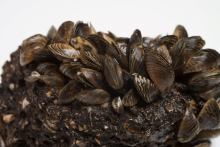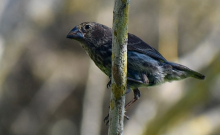The Event Horizon Telescope (EHT) Collaboration, including Professor Daryl Haggard at McGill University, has released new images of M87*, the supermassive black hole at the center of the galaxy Messier 87, using data from observations taken in April 2018. With the participation of the newly commissioned Greenland Telescope and a dramatically improved recording rate across the array, the 2018 observations give us a view of the source independent from the first observations in 2017.


A recent study from researchers in Canada and Germany has revealed that an unlikely event, occurring over 12 million years ago played an important role in shaping one of Canada’s most damaging invasive species. Zebra and quagga mussels, belonging to the Dreissenid family, are widespread freshwater invasive species throughout North America that present a significant danger to native ecosystems by competing for resources. Using a fibrous anchor called a byssus, Dreissenid mussels contribute to biofouling on surfaces and obstruct intake structures in power stations and water treatment plants.

Every year an estimated 20 million babies worldwide are born with low birth weight, according to the World Health Organization, leading to a wide range of significant short- and long-term consequences. And though you may think the obvious answer is greater emphasis on food and nutrition for pregnant women, leading McGill University researchers are proposing an unexpected solution: the cellphone.

A McGill-led team of researchers have made an important discovery shedding light on the genetic basis of a rare skeletal disorder. The study, published in Nature Communications, reveals that a defect in a specific gene (heterozygous variants in the matrix Gla protein, or MGP) may cause a disorder that affects the structure of connective tissues that supports the body.

Fleeting blasts of energy from space, known as fast radio bursts (FRBs), are a cosmic enigma. A Canadian-led international team of researchers has published new findings suggesting that supernovae are the predominant contributors to forming sources that eventually produce FRBs.

Researchers from McGill University, led by Professor Alanna Watt of the Department of Biology, have identified previously unknown changes in brain cells affected by a neurological disease. Their research, published in eLife, could pave the way to future treatments for the disease.

Exoplanets, planets located beyond our Solar System, captivate both scientists and the public, holding the promise of unveiling diverse planetary systems and potentially habitable worlds. Despite being very much not like our Earth, large gas giant planets found very close to their stars have proven to be ideal test targets for telescopes like the James Webb Space Telescope (JWST) to refine astronomers’ methods of understanding exoplanets.

Evolutionary biologists have long suspected that the diversification of a single species into multiple descendent species – that is, an “adaptive radiation” – is the result of each species adapting to a different environment. Yet formal tests of this hypothesis have been elusive owing to the difficulty of firmly establishing the relationship between species traits and evolutionary “fitness” for a group of related species that recently diverged from a common ancestral species.

The latest Canada’s food guide recommendations are primarily aimed at reducing chronic disease risk, however how well does our national guide for healthy eating serve the nutritional needs of all Canadians?

Physical, sexual, or emotional abuse, or neglect, either alone or combined with other types of childhood trauma, increases the risk of chronic pain and related disability in adulthood, according to new research. The findings from an international team of experts, including several McGill University researchers, underscore the urgency of addressing adverse childhood experiences (ACEs) – potentially traumatic events that occur before 18 years of age – and taking steps to mitigate their long-term impact on people’s health.

A common stomach bacteria found in two thirds of the world population may be linked to a higher risk of Alzheimer’s disease, new research suggests.

McGill University is launching a $3,000 Canada Award to offset tuition increases for Canadian undergraduate students from outside Quebec in certain disciplines. Approximately 80% of new Canadian students from outside Quebec coming to McGill will be eligible for the new award.

McGill University will divest from all direct holdings in fossil-fuel companies listed in the Carbon Underground 200 (CU200) for implementation in 2024 and completion in 2025 – one of eight commitments announced today in Phase 2 of the University’s results-driven socially responsible investment strategy.

McGill is calling on Premier François Legault to immediately reverse the government measures released today and go back to the drawing board.
“These policies are unacceptable. They are incoherent, not based on data and will not meet the stated objectives of the government. More importantly, their effect on the Quebec economy and on Quebec universities will be absolutely devastating. In short, they do not serve Quebecers well,” said Deep Saini, President and Vice-Chancellor of McGill University.


